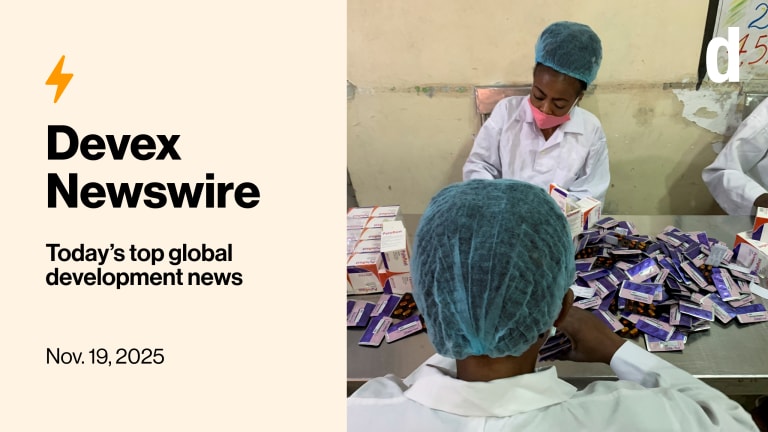Private sector foundations put up $250 million toward refugee initiatives

GENEVA — Business leaders kicked off the first Global Refugee Forum in Geneva on Tuesday by bringing in over $250 million in pledges.
More than 30 organizations — including the philanthropic arms of private sector giants, such as the Lego Foundation, the Vodafone Foundation, and the Ikea Foundation — committed resources to support the 70 million people displaced by war, conflict, and persecution.
“We need smart, inspiring, engaging and inclusive ways of helping refugees and host communities, and we can all play a role.”
— Filippo Grandi, United Nations high commissioner for refugees“As old conflicts continue and new ones erupt, displacing millions of people, we need smart, inspiring, engaging and inclusive ways of helping refugees and host communities, and we can all play a role,” said United Nations High Commissioner for Refugees Filippo Grandi in a statement.
The Global Compact on Refugees, which launched in 2018, is intended to provide governments, international organizations, and other stakeholders with a framework to ensure refugees and their host communities get the support they need. At this week’s first-ever Global Refugee Forum, stakeholders are meeting to commit to clear actions that will drive this initiative forward.
The role of the private sector in doing this has been pivotal, said Sarah Smith, senior director of education at the International Rescue Committee.
The biggest contribution came from the Ikea Foundation, which plans to award €100 million ($111 million) in program grants over the next five years. By 2022, Ikea stakeholders Ingka Group and Inter Ikea Group, along with the Ikea Foundation, also pledged to support access to job training and language skills initiatives for 2,500 refugees across 300 countries and to build sustainable livelihoods for 400 women alongside the Jordan River Foundation.
“We want to participate in changing the narrative around refugees in societies,” said Tolga Öncü, retail operations manager at Ingka Group, the parent company of Ikea, adding that Ikea is invested no matter the amount of time it takes. “It is good business to do good, and we at Ikea have the fortune to think in generations.”
Meanwhile, the Lego Foundation pledged $100 million toward play-based learning initiatives in Ethiopia and Uganda for children impacted by crises, and the Vodafone Foundation announced its intention to reach more than 500,000 young refugees by 2025 through the expansion of the Instant Network Schools program. In partnership with UNHCR, the program sets classrooms up with internet connectivity, electricity, computers, and mobile content while training teachers and providing technical support.
John Goodwin, chief executive officer of the Lego Foundation, said collaboration is a natural behavior in the private sector because it enables the most impact. He called on all stakeholders to “lean in” and do their part to change the narrative around refugees.
Other pledges from the private sector came in around business development services, investment in refugee-led companies, innovative financing, cash assistance, and access to clean and safe energy.
Despite the much-needed funding, some are skeptical of the role that the private sector can play in supporting refugees. Francine Menashy, associate professor at the University of Massachusetts Boston, said she would question companies’ underlying motivations.
“Although some companies might, of course, have altruistic goals in supporting refugee initiatives, our research — which included interviews with many business actors — found that many companies engaged in such activities hold clear profit-oriented motivations,” she said. “In the education sector specifically, such initiatives have led to decontextualized interventions based on little input from affected communities.”
But IRC’s Smith noted that whoever you work with, everybody has interests. “I have found that the private sector partners we’ve worked with are motivated by the same goals we are,” she said.
More than 100 companies and foundations are attending the Global Refugee Forum, which is co-hosted by UNHCR and the government of Switzerland this week.
Search for articles
Most Read
- 1
- 2
- 3
- 4
- 5








